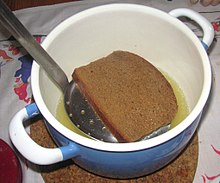Sop
 | |
| Type | Bread or toast |
|---|---|
| Main ingredients | Bread soaked in liquid foodstuffs |

A sop is a piece of bread or toast that is drenched in liquid and then eaten. In medieval cuisine, sops were very common; they were served with broth, soup, or wine and then picked apart into smaller pieces to soak in the liquid. At elaborate feasts, bread was often pre-cut into finger-sized pieces rather than broken off by the diners themselves. The bread or croutons traditionally served with French onion soup, which took its current form in the 18th century, can be considered modern-day sops.[citation needed]
Etymology
The word soup is a cognate of sop, both stemming ultimately from the same Germanic source. The word is mentioned in the Bible:
When Jesus had thus said, he was troubled in spirit, and testified, and said, Verily, verily, I say unto you, that one of you shall betray me. Then the disciples looked one on another, doubting of whom he spake. Now there was leaning on Jesus' bosom one of his disciples, whom Jesus loved. Simon Peter therefore beckoned to him, that he should ask who it should be of whom he spake. He then lying on Jesus' breast saith unto him, Lord, who is it? Jesus answered, He it is, to whom I shall give a sop, when I have dipped it. And when he had dipped the sop, he gave it to Judas Iscariot, the son of Simon.
In 19th century Australia, sop referred to a dish consisting of stale damper, soaked in cold tea and served with a dollop of jam on top for taste. This was mainly used in prisons and poor-houses, as well as institutions such as asylums.
In Portuguese, the word sopa, among other meanings, can generally refer to soup or, particularly in Alentejo, to a piece of dry or even stale bread that is part of the traditional fish broth. The sopa is soaked in the broth and eaten.
Expressions
The expression milksop describes a person as weak and indecisive. Its connotation is similar to that of "milquetoast".[citation needed]
The term supper derives from sop, and the expression toast of the town derives from the practices of dipping spiced toasted bread into liquid, and of honoring a dinner guest by referring to him or her by that term, which implies he or she adds spice to the dinner party.[1]
See also
- Fondue – Swiss melted cheese dish
- Migas canas – Spanish dish
- Milk toast – Breakfast dish consisting of toasted bread in warm milk
- Sopa de gato – Thick soup from southern Spain
- Trencher – Type of tableware used in medieval cuisine
References
- ^ Dan Jurafsky (17 October 2014). "Food Fridays: Where Does the Word Ketchup Come From? And Other Questions on the Language of Food". The Leonard Lopate Show. NPR.
Further reading
- Adamson, Melitta Weiss (2004). Food in Medieval Times. ISBN 0-313-32147-7.
External links
![]() The dictionary definition of sop at Wiktionary
The dictionary definition of sop at Wiktionary
